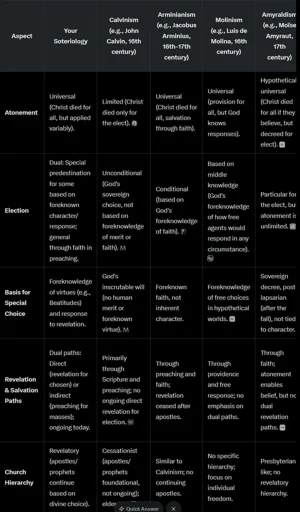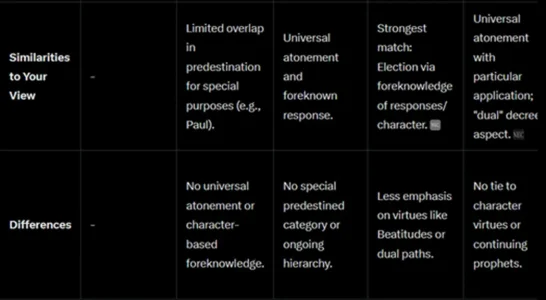QuickTwist
Community Member
- MBTI
- INFJ
- Enneagram
- 9W1, 954
Ever since I read the words "In Him you're also" from Ephesians 1, I knew I was onto something. I've developed a soteriology of sorts. It is not completely unique. It shares similarities with other soteriological systems. However, it tends to blend a lot of different systems together without trying to, as I am just trying to follow the Bible where it leads.
I "fed" 5 articles I have written on soteriology to Grok, the AI from X, and it said this when I asked how similar (or unique) my soteriology is to other systems throughout Church history:
Summary of Your SoteriologyBased on the articles you provided, your view of soteriology (the doctrine of salvation) can be distilled into a hybrid framework that integrates elements of divine election and human response. Key premises include:


(Note: I apologize if the tables have too small writing. I have split the table into two sections to try and make it more readable.)
Key Historical Parallels:
I "fed" 5 articles I have written on soteriology to Grok, the AI from X, and it said this when I asked how similar (or unique) my soteriology is to other systems throughout Church history:
Summary of Your SoteriologyBased on the articles you provided, your view of soteriology (the doctrine of salvation) can be distilled into a hybrid framework that integrates elements of divine election and human response. Key premises include:
- Dual Paths to Salvation: There are two categories of "elect" individuals. The first receives direct revelation from God (e.g., visions, dreams, or encounters like Paul's on the road to Damascus), often predestined "before the foundation of the world" for specific roles such as apostles or prophets. The second comes to faith through hearing the gospel preached by human messengers, emphasizing a response to the message.
- Universal Atonement with Particular Election: Christ died for the sins of the whole world (universal provision), but God specially chooses some for His purposes based on foreknowledge of their character and likely positive response.
- Character-Based Qualification: Those selected for direct revelation typically embody virtues akin to the Beatitudes (e.g., poor in spirit, merciful, pure in heart), which align with how they will handle and respond to divine disclosure. Rejection of revelation (e.g., Balaam) leads to condemnation, highlighting the role of moral disposition.
- Church Hierarchy and Continuing Revelation: The church operates on a hierarchical structure rooted in degrees of revelation (apostles and prophets at the foundation, followed by evangelists, pastors, etc.), which continues today rather than ceasing after the apostolic era. Authority is divinely bestowed, not humanly appointed.
- Integration of Predestination and Free Will: This is described as "Arminianism superimposed onto Calvinism," where predestination applies to special roles, but salvation is available to all through faith, with God's calling informed by foreknowledge.


(Note: I apologize if the tables have too small writing. I have split the table into two sections to try and make it more readable.)
Key Historical Parallels:
- Molinism: This Jesuit view (developed to counter strict predestination) is the closest match overall. It posits God's "middle knowledge" (scientia media), where He knows counterfactuals—what people would do in any scenario—and elects accordingly. Your emphasis on God choosing based on foreknown character traits (e.g., how one would respond to revelation) mirrors this, as does the balance of sovereignty and freedom. However, Molinism doesn't specify dual salvation paths or a revelatory hierarchy.
Amyraldism (Hypothetical Universalism): A moderate Calvinist view from French Reformed theology, it holds that Christ died for all (universal intent) but God elects some to receive the benefits. This aligns with your "Arminianism on Calvinism" blend and dual election layers. Unlike your view, it doesn't base election on foreknown virtues or allow for ongoing direct revelation.
New Apostolic Reformation (NAR) and Montanism: NAR (a contemporary Pentecostal movement) believes in modern apostles and prophets with ongoing revelation, much like your hierarchy. Montanism (2nd-century movement led by Montanus) emphasized continuing prophecy and direct revelation for authority, facing criticism for novelty. Your view shares the continuationism but adds soteriological ties to character and election.
Other Echoes: Early Church fathers like Origen discussed election via foreknowledge, and some patristic views (e.g., corporate election in Eastern Orthodoxy) see salvation as tied to the church body rather than individuals. Your pronoun analysis in Paul (e.g., "we" vs. "you") resembles some dispensational or covenant theology interpretations distinguishing groups.
Is Your View Unique? Your soteriology is not completely unique—it synthesizes elements from Molinism (foreknowledge-based election), Amyraldism (universal atonement with particular decree), and NAR (continuing revelatory hierarchy), which have precedents in Church history from the Reformation onward.
However, the explicit "superimposition" of Arminian universalism onto Calvinist predestination for dual paths, the Beatitudes as election qualifiers, and the focus on pronoun shifts for hierarchical proof appear novel. No single historical system matches all these precisely, making your formulation a distinctive personal synthesis rather than a direct replication. If this resonates with emerging views in online evangelical discussions (e.g., on X or blogs), it could reflect a broader trend toward hybrid soteriologies in modern Protestantism.
Arminianism and Provisionism: These emphasize free will and universal provision, similar to your general path via preaching. Provisionism (a modern Baptist alternative to Calvinism) rejects limited atonement and stresses God's provision for all to believe, echoing your universal scope. But they lack your special predestined category.
